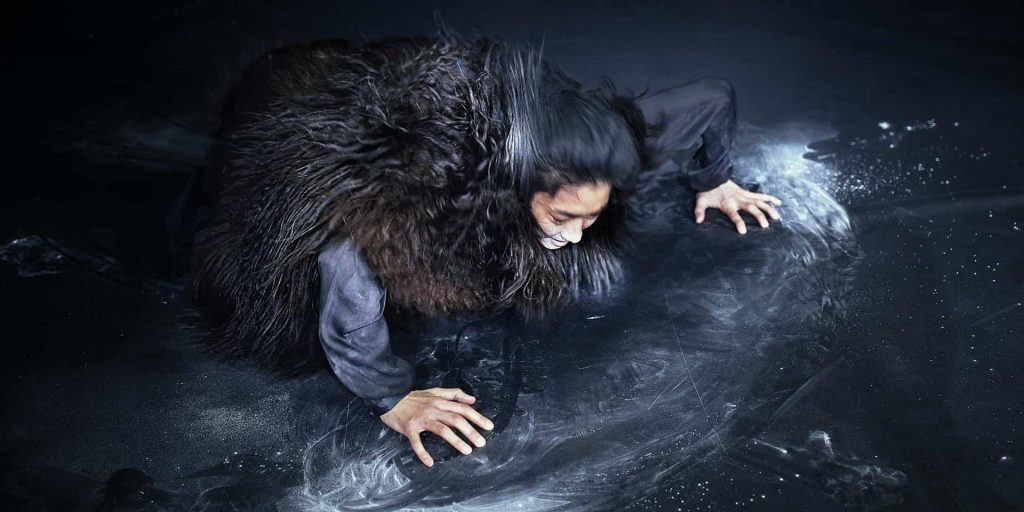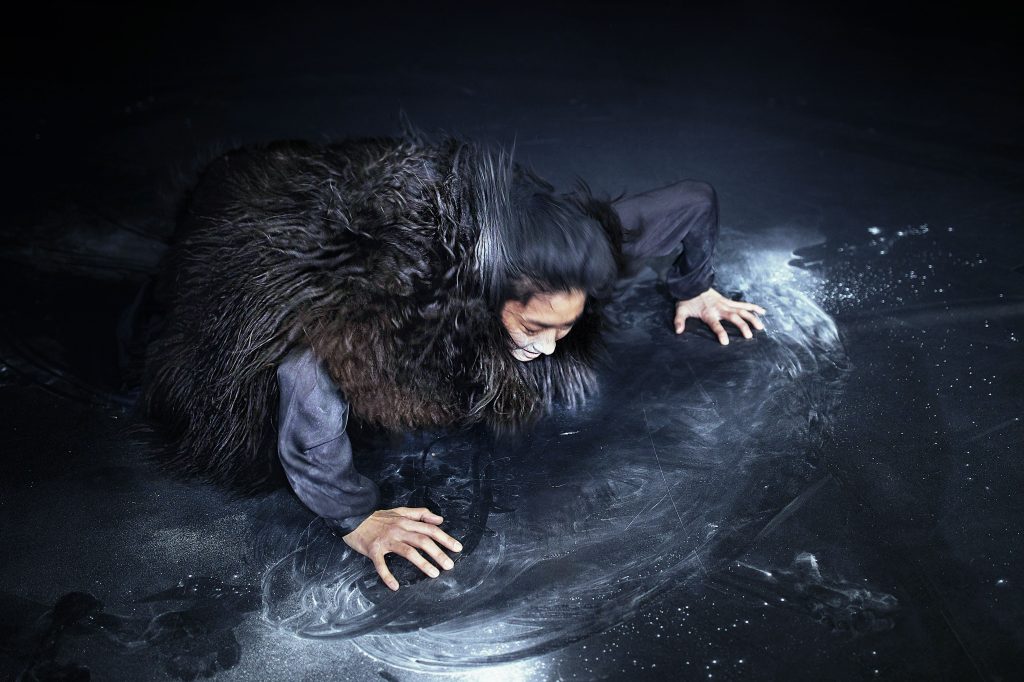
Rush of life and danse macabre: With “Nobody dies in the middle of his life” Nico and the Navigators continue their successful format of staged concerts.
With the premiere of Nobody dies in the middle of his life Nico and the Navigators will continue their successful format of staged concerts: How do we live with the certainty that we have to die? Are there exercises with which we can prepare ourselves for this farewell? Should we turn death into a celebration, as Nietzsche proposed? Or would it be better to dance on the volcano beforehand?
With music by Johann Sebastian Bach, Franz Schubert, Leonard Cohen, Rufus Wainwright, Klaus Nomi and others, quiet and euphoric moments alternate in a lively musical debate – and represent the power of death as the measure of all life. The dancers Yui Kawaguchi and Ruben Reniers meet in ecstatic death dances or become themselves the mysterious power of finiteness. They encounter the celebrated Russian baritone Nikolay Borchev, the soprano Julla von Landsberg, the American tenor Ted Schmitz and the speaker Annedore Kleist in sad, laconic and exhilarating scenes.
With their instruments the violinist Elfa Rún Kristinsdóttir, the double bass player Winfried Holzenkamp and the percussionist Philipp Kullen provide a wide sound spectrum between baroque and pop, between art song and quodlibet. Matan Porat, who has made a name for himself both as a pianist and as a composer, has worked on a part of the music in an artfully profound way and takes over the musical direction on the grand piano.

“It is not only sadness and melancholy that is transported by the songs. But sometimes also an unexpected friendship with death, a waiting for it, a welcome … It’s good that the musicians and dancers have forged their own path through the material and that you can simply leave yourself to their guidance for longer passages and enjoy the dance and their music without thinking about death.”
Life intoxication and dance of death at Radialsystem: "Nico and the Navigators" play with mortality in their scenic concert
Suddenly it's winter. Not outside the Radialsystem, of course, where the party boats are sailing across the Spree, people are fanning themselves on the banks, and it's still hot in the evening. Inside, however, singers and dancers throw on furs and black coats, boas made of black feathers and dark hoods. As if they could thus protect themselves from death, the cold of dying and the fear of it. For they cross the field before the end of life, "No one dies in the middle of his life" is the title of the wide-ranging program of songs, ranging from time-honored music (John Dowland, Claudio Monteverdi, Bach) to a broad romantic midfield (Schubert, Tchaikovsky, Chopin, Mussorgsky) to the present (Lou Reed, Leonhard Cohen).
The company "Nico and the Navigators" around director Nicola Hümpel has been performing in Berlin for 20 years at ever-changing venues. Musicians, actors, dancers and singers are part of it, they work on theater and music history. The scenic concert "Nobody dies in the middle of his life" was premiered at the Konzerthaus Berlin in March. The relationship of death is changing, and this is reflected in music. Can one still imagine hanging up death masks of deceased family members today? asks actress Annedore Kleist. One of her monologues is about the concern for health, genes, sports, nutrition, stress management, wide-ranging are the topics, which in this context suddenly seem like a great device to keep the thought of one's own mortality far away. Yui Kawaguchi and Ruben Reniers have something archaic and grotesque in their dances. Often only their arms protrude from their fur costumes, their hands grasping like claws. They could be spirits mediating between the living and the dead. At times they brace themselves against the singers, offer resistance or tug at them, and the songs thus change their energy, intensify in expression. Rarely do they intervene with an illustration, then they become a powerful, almost folk-dancing couple. This is the case in "Dance me to the end of love", the place a mortuary, where to the right and to the left already lie the dead.
It is not only sadness and melancholy that is transported by the songs. But sometimes also an unexpected friendship with death, a waiting for it, a welcome. When the soprano Julla von Landsberg sings "Komm großer schwarzer Vogel" by Ludwig Hirsch, always interrupted by laughter, it is of incredible approval. On the other hand, when tenor Ted Schmitz, in the 1878 aria "Vorrei morire," imagines wanting to die on a spring day as the birds sing, one may be enraptured by the lyrical mood, but then stumbles over too much sweetness and transfiguration. When the baritone Nikolai Borchev sings "Life is a dream" by Joseph Haydn, we are asked by Ted, it doesn't sound like a beer advertisement now, one wouldn't have thought of it oneself just then. The feelings ignited by the music already take up the most space, but how they comment on each other, or occasionally veer off from a direction just taken, makes things more exciting. However, the evening is long, and one does not always understand the texts, which can all be read in the program booklet. It is good that the musicians and dancers have made their own way through the material and that one can simply leave oneself to their guidance over longer passages and enjoy the dance and their music without thinking about death.
“Nobody really likes to deal with death… But when ‘Nico and the Navigators’ take on this theme, fear is out of place, the style of the company founded in 1998 by Nicola Hümpel (direction and artistic direction) and Oliver Proske (spatial conception) is too clever and playful, too cheerful and nonchalant.”
No one really likes to deal with death. People prefer to repress the topic because they don't want to confront the fact that there is a final end for everyone, and sometimes under dire or painful circumstances. But when "Nico and the Navigators" take on this theme, fear is out of place; the style of the company founded in 1998 by Nicola Hümpel (direction and artistic direction) and Oliver Proske (spatial conception) is too clever and playful, too cheerful and nonchalant. In April, their new play "Niemand stirbt in der Mitte seines Lebens" premiered at the Konzerthaus. Now this evening about "Lebensrausch und Totentänze" can be seen for three performances at Radialsystem. Nico and The Navigators with "Nobody dies in the middle of his life". Even the title is a bit of a gag, since there is of course no insurance for the jaunty statement. But in its lightheartedness, you really want to believe it, don't you? Maybe a little bit also because of him this production is so loved by the audience. "We were able to enjoy super positive feedback everywhere," says Nicola Hümpel: "The audience usually lets themselves in openly and without shyness to the various aspects of the productions. During discussions after the performance, there were passionate and extremely honest discussions, which was a very special experience." For the ensemble, it is of course extremely uplifting that the intensive and unprotected examination of the complex of "dying and death" was appreciated in such a way. The actors see this as encouragement to continue to tackle the superficialities of everyday life with the means of art. And to examine for themselves what sense and purpose there is in always wanting to be active and to maintain control in every situation. Because some things are stronger - and sometimes it's better to get involved with them than to resist them at all costs. Personal experiences play a role in this play, the final farewells, for example, from grandparents and parents, from friends and colleagues. Nicola Hümpel was inspired, among other things, by Michael Haneke's film "Love. At first she wanted to flee the cinema right away, but then she stayed and was quite happy to have watched the old couple until the end. Nevertheless, the "staged concert" does not cower in melancholy and melancholy, but sees itself as a fearless, determined celebration of life - especially in the face of death. There is much to laugh about and not only depressive music. Basically, the evening is Dionysian in character and shows a high-pitched delight in existence as "dancing and celebrating against one's own mortality," says Hümpel. Accordingly, a phrase by Christoph Schlingensief, who died in 2010 at the age of fifty, sets the tone: "I'd love to just shout to everyone how great it is to be on Earth!" In addition to the dancers Yui Kawaguchi and Ruben Reniers, singers participate and, along the way, let all kinds of evocative noises sound works by, for example, Johann Sebastian Bach and Franz Schubert, as well as songs by Leonard Cohen, Ludwig Hirsch, Rufus Wainwright and Paul Simon ("The Sound of Silence"). In addition, violinist Elfa Rún Kristinsdóttir, double bassist Winfried Holzenkamp and percussionist Philipp Kullen provide a broad spectrum of sounds between baroque and pop, between art song and quodlibet. Matan Porat, who himself sits at the piano, is responsible for the musical direction and arrangements. After this multiple and challenging subject, the company, which despite its enormous successes at home and abroad has to fight for economic survival year after year, will soon dedicate itself to the Bauhaus on the occasion of its 100th anniversary. "The Betrayal of Images" will be a performative journey through the Dessau Masters' Houses, the Kolbe Museum in Berlin and all the way to Brussels, asking about the reliability of the visible and the manipulation of perception.
“The movement vocabulary seems almost inexhaustible, including dervish ecstasy and computer game-like jerkiness … The musical spectrum of this staged concert spans 400 years. Respect for the original does not exclude contemporary appropriation. Beat the drum and don’t be afraid …”
Beforehand: Amuse-Esprit, with the kind support of Wikipedia
Navigation - from lat. navigare (leading a ship), sanskrit navgathi - is the "art of steering" on water, on land and in the air ... Steering is preceded by two geometric tasks: establishing the current position (...) and determining the best route to the destination ... Navigation in the most general sense includes other aspects, such as the sense of balance and spatial awareness. It can then be defined as finding one's way in a topographical space in order to reach a desired location.
With dance, performance, acting and music, Nico & The Navigators have established "helmsmanship" in the element of the stage, as finding one's way in the open space of human existence.
Appetizer: Back to the roots, own harvest
The first time I wrote about Nico & The Navigators was in June 2000. At that time the company presented "Eggs on Earth" in the Sophiensaele: Nicola Hümpel founded this small company in 1998 at the Bauhaus in Dessau, meanwhile it is based in Berlin, "Ich war auch schon mal in Amerika" was the name of the first piece, still developed in Dessau, then came "Lucky Days, Fremder", and now therefore "Eggs on Earth". And with this, only their third production, the troupe finally crosses the border from insider tip to scene greatness ... If "Nico & The Navigators" continue like this, nothing should stand in their way on this path.
Last year, in 2018, the company celebrated its 20th anniversary. A miracle, in view of the equally enormous and lasting financing problems with which the free group - regardless of its artistic successes - has to fight to the death. Over and over and over again.
In the anniversary production "The Future of Yesterday - Menschenbilder 2.0," the "Navigators" compared their dreams and fears of yesteryear with those of today, and their expectations and hopes for the future.
Reveling in memories became a reflection on the past, present and future. Walking a very fine line between pathos and nonsense, melancholy and lightness, instinct and intellect, Nicola Hümpel, her congenial stage and costume designer and life partner Oliver Proske, and their fellow performers, the Navigators, have always playfully explored existential questions, drawing from the fund of their own experiences and developing the pieces from the improvisations "guided" by Nico. They call them human images. Or landscapes of thought.
Love, friendship, family. Decisions, aberrations, fears. Happiness, unhappiness. Longing, strangeness. And now: death. And the life before it. Eros and Thanatos. No more and no less.
Main course: the new piece, self-tasting
Wavering figures approach from the edges. Lemur-like black shadows. Ghosts without bodies, only extremities: Hands, feet. But they have a voice, And they sing: Matthias Claudius' "Abendlied," set to music by Johann Abraham Schulz (1747-1800)
You finally want to take
From this world take us
By a gentle death!
And, when thou hast taken us,
Let us come in heaven, Thou our
Lord and our God!
No, wait a minute: heaven can wait. After all, there's still dancing and singing to be done. No life without death. But also no death without life. No loss without gain. Before the dances of death comes the intoxication of life. But do you celebrate life only when death is already breathing down your neck? "Nobody dies in the middle of his life" because: who knows where it is, the middle, if you don't know the end?
Is death the end? Is it a spectre? Or a savior? And do I have to cry at grandpa's funeral even though I'm just hungry? (asks Matan Porat, musical director of the evening).
The reservoir of thoughts and feelings, personal experiences, philosophical profundities and artistic to humorous expressions is almost inexhaustible. I have just been to another funeral followed by a funeral feast. But how can this be summarized in a theater evening, which must have a beginning and also an end? And a manageable duration. Two hours. One intermission. Drinks can be ordered in advance. I can't say it any other way: but these Navigators have once again proven their "helmsmanship". What seems to be so dreamlike safe is hard, creative work. The program booklet says, "Search till it crunches."
Ingredients and side dishes, New Remixes
The theater space has walls, the play knows no boundaries. Not in time. Not in space. Not geographically. Not cultural. Not national. Not ethnically or religiously anyway. The navigators of this production are from here, Israel, USA, Italy, Russia, Japan, Indonesia/Netherlands. They speak different body/languages and are easily able to form an ensemble. To communicate, to cross-fertilize, to enrich.
The movement vocabulary seems almost inexhaustible, including dervish ecstasy and computer game-like jerkiness. With the new navigator Ruben Reniers, the expressive Yui Kawaguchi has found an adequate partner. The musical spectrum of this "staged concert" spans 400 years. Respect for the original does not exclude contemporary appropriation. Beat the drum and do not be afraid .... The oldest pieces date from a time when most people still believed that the sun revolved around the earth and not vice versa. From Monteverdi, Bach, Handel, Beethoven, Mozart, Rameau, Schubert (no Nico piece without Schubert!!!), even Ligeti to Hank Williams, Paul Simon and Rufus Wainwright. And Leonard Cohen: His "Dance Me to The End Of Love" is sung by Julia von Landsberg and Ted Schmitz in a duet, so driven with Balkanese drive Matan Porat ( piano), Elfa Rún Kristindottír (violin) and Wilfried Holzenkamp (double bass & electric bass) that he himself would probably hardly recognize his work.
Later, Julia von Landsberg, the soprano, still celebrates in appropriate dialect and shrill-grotesque performance the legend of the Austriak affinity to morbidity with the legendary dark-grey song by Ludwig Hirsch: "Komm, großer schwarzer Vogel" (Come, big black bird), which in its time was no longer played on Austrian radio after 10 p.m. for fear that listeners might be inspired to commit suicide.
And then we fly up,
right into the middle of heaven,
into a new time, into a new world.
And I will sing, I will laugh,
I'll shout "No way!"...
Annedore Kleist with her down-to-earth diction develops the chain of evidence extraordinarily comforting for the spectators that none of us spectators would be disposed of on the spot, even if he died during the performance, but would be allowed to stay until the final applause.
What color is death? Black? White? Does he wear a hood? Pants? Skirts? Everything. Sometimes like this. Sometimes like this. From black animal skins to white teddy coats, or just arm warmers to angel robes. Everything thereby.
It is also spoken. Annedore Kleist, the actress among the Navigators, quotes Christoph Schlingensief: "I'd love to just shout to everyone how great it is to be on Earth." Or: "that hatred is not worth it."
Dessert: Two-fer from the Total Eclipse, served hot as hell.
1743: Aria of Samson. Music: George Frideric Handel - Lyrics: John Milton
1981: Aria of Klaus Nomi. Songwriter: Kristian Hoffman.
Ted Schmitz - singing both into each other - once again outgrows himself.
Phillipp Kullen stages a last wild rebellion on his drums.
Then a persistent violin note by Elfa Rún Kristinsdóttir, like the exit signal of a hospital machinery.
Hello Darkness. Just Silence.
“There it is all of a sudden, the burst from indifference, the dance of death and the rush of life, that ambivalence, the urgency and inevitability, the passion and the tears … The bittersweet sting is in place.”
The collective Nico and the Navigators digs through 400 years of music history - with an emphasis on death - in "Nobody Dies in the Middle of Life." At the premiere in Berlin's Konzerthaus on Wednesday, the emotional drop height was missing, writes Jakob Bauer. Of course, it can't be missing from an evening about death: Chopin's Funeral March, which waltzes through the hall in deep blackness. It is music that evokes images in a fraction of a second, of funerals, of weeping people - of death. With this clear assignment and localization, he is the absolute exception on this evening. For the six women and men on stage, who dance and sing, reveal personal details and philosophize about death with the words of poets and thinkers, draw anything but a clear picture of death on this evening. From Monteverdi to Hank Williams This becomes clear right at the beginning: There the Navigators switch from almost 400 years old music from Monteverdi to country legend Hank Williams. "The Angel Of Death" is the name of the song, which undoubtedly deals with its own finiteness in a melancholy way. On this evening, however, the drummer of the Navigators plays on a marimba - whereby the Angel of Death loses its danger and rather develops a cheerful note. This is not only reinforced by the fact that two black-clad figures are driving around the marimba more comically than creepily, trying to get the drummer out of time. For the ironic refraction of the supposedly so heavy topic of death has system on this evening. "When I was at my grandma's funeral, everyone thought I was sad. But I was just hungry," the musical director of the four-member ensemble, Matan Porat, tells us at the beginning of the second half of the evening. All the other artists - musicians, dancers and singers - also tell little personal stories about death, from cheerful to cloudy, funny or without any punch line. Between the pieces, a speaker reflects on death: What should I be afraid of? What actually is time and how much of it do I have left? What would happen if someone died in this room - isn't death too much of a taboo? The distance to death remains The more time passes on this evening, the more it seems as if one does not really get closer to death here either. The topic is supposed to be treated ambivalently and not too heavily - good, but because of that, at least here the feelings make themselves comfortable in mediocrity. One is appreciative, but little moved. The music of the more than 30 pieces is great interlocked - the emotions are not. Too much is delivered with a literal wink. But the humor, which sometimes goes into slapstick, would first need an emotional drop to really work. When ashes are literally slapped on one's head, it is less cathartic than silly. One holds back, the distance to death remains. And all around the world comes to an end Until the last quarter of the evening. Introduced by Chopin's funeral march and Schlingensief's quote "I would just like to shout to all people how great it is to be on this earth", the Navigators turn up the heat. Suddenly there it is, the outbreak from indifference, the dance of death and the intoxication of life, this ambivalence, the urgency and inevitability, the passion and the tears. As a couple turns very slowly, gazing lovingly - she in black, he in white - on stage, the world around them goes to hell in a musical chaos and wild dervish dance. The bitter-sweet sting sits. He could only have drilled a little deeper.
A production of Nico and the Navigators. Co-produced by Konzerthaus Berlin and Bozar Music Brussels. Funded by the Senate Department for Culture and Europe. In cooperation with Radialsystem.




Tickets for this date are not available yet. Leave your mail adress to get notified when tickets are available.